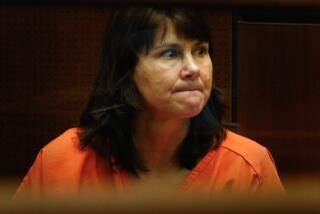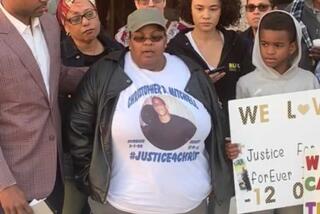Judge Overruled in Murder-for-Hire Case : Conspiracy Charges Against 2 Former LAPD Officers Restored
- Share via
In a victory for the prosecution, a Los Angeles Superior Court judge Tuesday reinstated key elements of a conspiracy charge against two former Los Angeles police officers accused of carrying out a contract murder.
Judge Alexander H. Williams III ruled that another judge, who had earlier presided over the case of Richard H. Ford and Robert A. VonVillas, erred when he gutted the conspiracy charge filed against the former officers.
Over the objections of defense attorneys, Williams said Deputy Dist. Atty. Robert P. O’Neill can present to jurors a list of 25 “overt acts” that Ford and VonVillas allegedly committed as part of a conspiracy to murder Northridge businessman Thomas Weed.
Weed disappeared in February, 1983, but his body has never been found. Weed’s estranged wife has told authorities that she agreed to pay VonVillas and a companion $20,000 for the killing. The trial is scheduled to begin next month.
To prove the conspiracy charge, O’Neill must convince jurors that Ford and VonVillas first agreed to kill Weed and that they then engaged in at least one of the 25 “overt acts.” In addition to conspiracy, Ford and VonVillas are both charged with murder. They could face the death penalty.
Earlier this month, Superior Court Judge Robert T. Altman, who had presided over pretrial proceedings, struck from the conspiracy charge all 71 overt acts that had been alleged by prosecutors. Altman then ruled that the district attorney’s office could present evidence of only one overt act to the jury: the alleged murder of Thomas Weed.
In effect, Altman decided that the district attorney’s office had to prove Weed’s murder in order to prove the conspiracy.
Williams inherited the case after Deputy Dist. Atty. Robert N. Jorgensen disqualified Altman through a little-used legal maneuver that allows a prosecutor one opportunity to throw a judge off a case without presenting evidence of prejudice.
Jorgensen said Tuesday that he later asked to be removed from the case, “because I felt that as a result of what happened in court, I had become the focus of attention in the case and that could be harmful to the interests of the prosecution.”
In his ruling Tuesday, Williams said Altman made an error of law when Altman asserted that conversations between co-conspirators cannot be considered overt acts. However, Williams upheld other portions of Altman’s rulings and thus reinstated only 25 of the 71 acts originally alleged by the prosecution.
Outside Williams’ courtroom, attorney Rickard Santwier, one of Ford’s two lawyers, said, “In my opinion, he (Williams) misunderstands what the court’s authority is. . . . He acts as an appellate judge, and I don’t think he can do that.”
More to Read
Sign up for Essential California
The most important California stories and recommendations in your inbox every morning.
You may occasionally receive promotional content from the Los Angeles Times.










